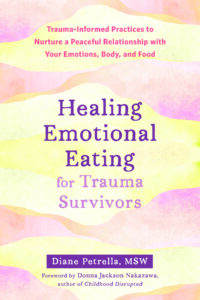MY NEW BOOK: Healing Emotional Eating for Trauma Survivors
 Heal the trauma at the root of your emotional eating.
Heal the trauma at the root of your emotional eating.
Were you emotionally, physically, or sexually abused a child?
Did you suffer a tragic loss, live in chaos, or endure other adverse experiences?
And when you feel overwhelmed and in pain, do you use food to cope?
If so, my book will help.
Healing Emotional Eating for Trauma Survivors: Trauma-Informed Practices to Nurture a Peaceful Relationship with Your Emotions, Body, and Food reveals the connection between early traumatic experiences and emotional eating.
Perhaps you never thought that your emotional eating challenges had anything to do with experiences from your past.
They do. My book will help you understand why and offers steps you can take to heal.
You’ve probably heard all your life that all you need to do to stop emotionally eating is more willpower. But that’s not true. Early trauma affected your nervous system in such a way that you became hypersensitive to stress. When you feel triggered and gripped with anxiety, fear, or sadness, it makes sense that you use food to ground and soothe yourself.
You’re just trying to cope in the best way you know.
Healing Emotional Eating for Trauma Survivors is the culmination of my nearly 40-year career working with children and adults who experienced childhood trauma and use food to soothe and comfort themselves. It helps you understand that emotional eating is not your fault and you do not lack willpower if you’re having a hard time stopping.
My book teaches you about the effects of early trauma on your nervous system, how trauma shaped the beliefs you hold of yourself and your world, why food helps calm and ground you, and how to embrace and honor your feelings without using food to numb them.
You’ll learn practical and powerful strategies rooted in trauma science to help you create a more harmonious and respectful relationship with your body, food, and your feelings. You’ll also learn how to connect with your inner wisdom—your Wise Self—for guidance and support on your journey.
You can learn more and order here.
My hope for my book is that it be a reminder that you are not alone with your struggles and that healing is possible.
I wrote it for you, with love. ❤️


 Do you compulsively overeat and struggle with your weight?
Do you compulsively overeat and struggle with your weight? One of the simplest things you can do to support your emotional eating and trauma-healing journey is to declutter your life. Here’s why:
One of the simplest things you can do to support your emotional eating and trauma-healing journey is to declutter your life. Here’s why:
 ‘Tis the season of joy and good cheer… right?
‘Tis the season of joy and good cheer… right? Does fear limit your life?
Does fear limit your life?
 “Are you beach body ready?”
“Are you beach body ready?”

